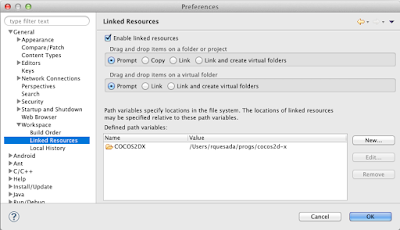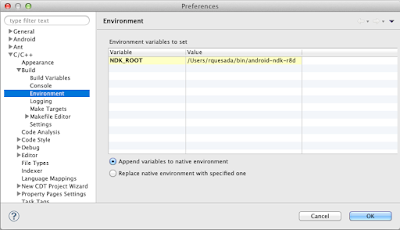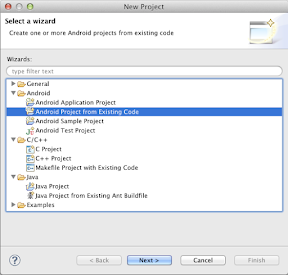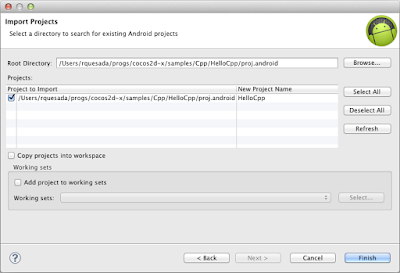2013-03-05 03:46:57 +08:00
|
|
|
## Prerequisites:
|
|
|
|
|
|
|
|
|
|
* Android NDK
|
|
|
|
|
* Android SDK **OR** Eclipse ADT Bundle
|
|
|
|
|
* Android AVD target installed
|
|
|
|
|
|
|
|
|
|
## Building project
|
|
|
|
|
|
|
|
|
|
There are two ways of building Android projects.
|
|
|
|
|
|
|
|
|
|
1. Eclipse
|
|
|
|
|
2. Command Line
|
|
|
|
|
|
|
|
|
|
### Import Project in Eclipse
|
|
|
|
|
|
|
|
|
|
#### Features:
|
|
|
|
|
|
|
|
|
|
1. Complete workflow from Eclipse, including:
|
2013-03-16 06:20:39 +08:00
|
|
|
* Build C++.
|
|
|
|
|
* Clean C++.
|
|
|
|
|
* Build and Run whole project.
|
|
|
|
|
* Logcat view.
|
|
|
|
|
* Debug Java code.
|
|
|
|
|
* Javascript editor.
|
|
|
|
|
* Project management.
|
2013-03-05 03:46:57 +08:00
|
|
|
2. True C++ editing, including:
|
2013-03-16 06:20:39 +08:00
|
|
|
* Code completion.
|
|
|
|
|
* Jump to definition.
|
|
|
|
|
* Refactoring tools etc.
|
|
|
|
|
* Quick open C++ files.
|
2013-03-05 03:46:57 +08:00
|
|
|
|
|
|
|
|
|
2013-03-16 06:20:39 +08:00
|
|
|
#### Setup Eclipse Environment (only once)
|
2013-03-05 03:46:57 +08:00
|
|
|
|
|
|
|
|
|
|
|
|
|
**NOTE:** This step needs to be done only once to setup the Eclipse environment for cocos2d-x projects. Skip this section if you've done this before.
|
|
|
|
|
|
2013-03-16 06:20:39 +08:00
|
|
|
1. Download Eclipse ADT bundle from [Google ADT homepage](http://developer.android.com/sdk/index.html)
|
2013-03-05 03:46:57 +08:00
|
|
|
|
|
|
|
|
**OR**
|
|
|
|
|
|
|
|
|
|
Install Eclipse with Java. Add ADT and CDT plugins.
|
2013-03-18 16:15:48 +08:00
|
|
|
|
|
|
|
|
2. Only for Windows
|
|
|
|
|
1. Install [Cygwin](http://www.cygwin.com/) with make (select make package from the list during the install).
|
|
|
|
|
2. Add `Cygwin\bin` directory to system PATH variable.
|
|
|
|
|
3. Add this line `none /cygdrive cygdrive binary,noacl,posix=0,user 0 0` to `Cygwin\etc\fstab` file.
|
2013-03-05 03:46:57 +08:00
|
|
|
|
2013-03-18 16:15:48 +08:00
|
|
|
3. Set up Variables:
|
2013-03-16 06:20:39 +08:00
|
|
|
1. Path Variable `COCOS2DX`:
|
|
|
|
|
* Eclipse->Preferences->General->Workspace->**Linked Resources**
|
|
|
|
|
* Click **New** button to add a Path Variable `COCOS2DX` pointing to the root cocos2d-x directory.
|
|
|
|
|

|
|
|
|
|
|
|
|
|
|
2. C/C++ Environment Variable `NDK_ROOT`:
|
|
|
|
|
* Eclipse->Preferences->C/C++->Build->**Environment**.
|
|
|
|
|
* Click **Add** button and add a new variable `NDK_ROOT` pointing to the root NDK directory.
|
|
|
|
|

|
2013-03-21 23:04:53 +08:00
|
|
|
* Only for Windows: Add new variables **CYGWIN** with value `nodosfilewarning` and **SHELLOPTS** with value `igncr`
|
2013-03-05 03:46:57 +08:00
|
|
|
|
2013-03-18 16:15:48 +08:00
|
|
|
4. Import libcocos2dx library project:
|
2013-03-16 06:20:39 +08:00
|
|
|
1. File->New->Project->Android Project From Existing Code.
|
|
|
|
|
2. Click **Browse** button and open `cocos2d-x/cocos2dx/platform/android/java` directory.
|
2013-03-05 03:46:57 +08:00
|
|
|
3. Click **Finish** to add project.
|
|
|
|
|
|
|
|
|
|
#### Adding and running from Eclipse
|
|
|
|
|
|
2013-03-16 06:20:39 +08:00
|
|
|
 
|
2013-03-05 03:46:57 +08:00
|
|
|
|
2013-03-16 06:20:39 +08:00
|
|
|
1. File->New->Project->Android Project From Existing Code
|
|
|
|
|
2. **Browse** to your project directory. eg: `cocos2d-x/cocos2dx/samples/Cpp/TestCpp/proj.android/`
|
2013-03-05 03:46:57 +08:00
|
|
|
3. Add the project
|
|
|
|
|
4. Click **Run** or **Debug** to compile C++ followed by Java and to run on connected device or emulator.
|
|
|
|
|
|
|
|
|
|
|
|
|
|
|
### Running project from Command Line
|
|
|
|
|
|
2013-03-16 06:20:39 +08:00
|
|
|
$ cd cocos2d-x/samples/Cpp/TestCpp/proj.android/
|
|
|
|
|
$ export NDK_ROOT=/path/to/ndk
|
|
|
|
|
$ ./build_native.sh
|
|
|
|
|
$ ant debug install
|
|
|
|
|
|
|
|
|
|
If the last command results in sdk.dir missing error then do:
|
|
|
|
|
|
|
|
|
|
$ android list target
|
|
|
|
|
$ android update project -p . -t (id from step 6)
|
|
|
|
|
$ android update project -p cocos2d-x/cocos2dx/platform/android/java/ -t (id from step 6)
|